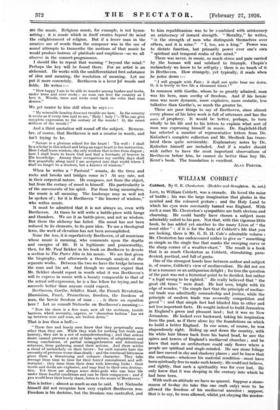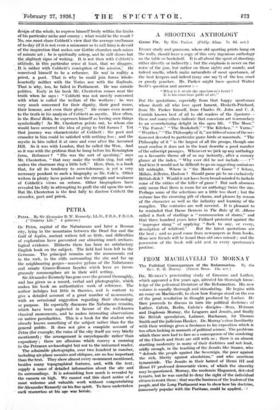:WILLIAM CCIBBETr .
LIFE, to William Cobbett, was a crusade. He loved the noise of battle ; his was the large imagination that glories in the symbol and the coloured gesture ; and the Holy Land to which his eyes were constantly turned was England. With such a man Mr. Chesterton's. sympathies are both obvious and charming. He could hardly have chosen a subject more admirably suited to his pen. Not that, with this vigorous little book, he has added yet another to the many Lives of " the rural rider " : if it is for the facts of Cobbett's life that you are looking, there is Mr. G. D. H. Cole's admirable volume : Mr. Chesterton has endeavoured rather to give us " something as simple as the single line that marks the sweeping curve or the sharp corner of a weather-chart." The result is a book that is as much Chesterton as Cobbett, stimulating, para- doxical, poetical, and full of gusto.
One of the strongest bonds here between author and subject is, of course, Cobbett's view of mediaevalism. He did not see it as a romance or an antiquarian delight ; for him the question of the past was not a historical point to he decided, but rather " a legal wrong to be righted." He really believed that " the good old times " were dead. He' had seen, bright with its edge of wonder, " the simple fact that the principle of mediae- val trade was admittedly comradeship and justice, while the principle of modern trade was avowedly competition and greed " : and that simple fact had blinded him to other and not less important facts. He sought indeed to build Jerusalem in England's green and pleasant land ; but it was no New Jerusalem. He looked ever backward, taking his inspiration from the past, as if there alone lay the foundations on which to. build a better England. In one sense, of course, he was stupendously right. Riding up and down the country, with his white hair blown back from his bared head, he saw the spires and towers of England's mediaeval churches ; and he knew that such an architecture could only flower where a -people are spiritual and single-minded. He saw stone foliage and face carved in shy and shadowy places ; and he knew that -the craftsman—whatever his material condition—must have been spiritually free to make such beauty. He could not believe, -and rightly, that such a spirituality was for ever lost. He only knew that it was sleeping in the century into which he had been born.
With such an attitude we have no quarrel. Suppose a stone- mason of to-day - (to take this one craft only) were to be allowed the freedom of his mediaeval ancestor : suppose, that is to say, he were allowed, whilst yet obeying the master-
design of the whole, to express himself freely within thn limits of his particular niche and cranny ; what would be the result ? No, one must share Cobbett's view that the average craftsman of to-day (if it is not even a misnomer so to call him) is devoid of the inspiration that makes our Gothic churcheS such mines of minute art ; he is spiritually asleep, and he still shows but the slighteit 'signs of waking. It is not then with Cobbett's attitude, m this particular sense at least, that we 'disagree. It is rather with Cobbett's Coneeption of his mission;'' He conceived 'himself to be a reformer. He wad' in rethity a priest, a poet. That is why he could join forces 4/hole- heartedly neither with the Tories nor with the Radicals. That is why, too, he failed in Parliament. He was outside politics. Early in his book Mr. Chesterton comes near the truth when he says " Cobbett was not merely concerned with what is called the welfare of the workers : he was very much concerned for their dignity, their good name, their honour, and even their glory." He comes even nearer to the truth in his analysis of Cobbett as mystic. How often, in the Rural Rides, he expresses himself as having seen things symbolically! As Mr. Chesterton points out, to whom else would have occurred the idea of going to Old Sarum ? Yet that journey was characteristic of Cobbett : the poet and crusader in him could be satisfied with nothing less ; and the mystic in him called it at once and ever after the Accursed Hill. So it was with London, that he called the Wen. And so it was with the gridiron that he hung before his Kensington farm. Reformer " His was the sort of speaking," says Mr. Chesterton, " that may make the welkin ring, but only makes the chairman ring a little bell." Here, then, is a book that, for all its tendency to over-tolerance, is yet a very necessary pendant to such a biography as Mr. Cole's. Other writers in plenty have pointed out the strength and weakness of -Cobbett's -views on reform. Other biographers have revealed his folly in attempting to graft the old upon the new. But Mr. Chesterton is the first fully to disclose Cobbett the crusader, poet and priest.























































 Previous page
Previous page